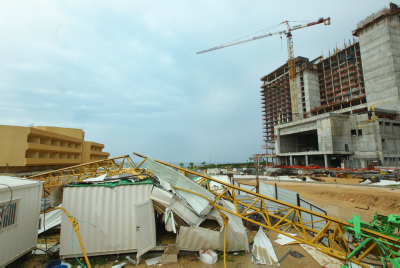Treasury: Third-Apartment Tax Successful, Even Before It’s Law

The proposed “third-apartment tax” being promoted by Israel Finance Minister Moshe Kachlon is already having the desired effect, even before it becomes law, the Finance Ministry said in its analysis of the latest real-estate sales figures. A total of 9,500 homes and apartments were bought and sold in August, 2-percent fewer than in July, which itself had 6-percent fewer sales than did June. Those were the months that discussion of the proposed tax in the media reached its peak, and as far as the Treasury is concerned, the figures indicate that investors are beginning to think twice about buying real estate.
Indeed, it appeared that it was the investors who were responsible for the falloff, with a 14-percent dropoff in sales to individuals who already owned at least one property. Sales were off in all areas of the country, except for the Nazareth district. Sales in Be’er Sheva and Haifa, two favorite targets of investment apartment purchases, were off 18 percent and 16 percent respectively.
In fact, said the Ministry, the only reason total sales of apartments were not off even more was because of the success of the marketing of “Price Investor” and “Price Target” projects in Rosh Ha’ayin and Kiryat Motzkin. Those projects allow contractors to build homes for general sale, while providing benefits when they reserve a percentage of the homes for sale to young couples, who can buy them at a discount.
The tax, which is part of the Arrangements Law that accompanies the state budget, will kick in on January 1st. Under the law, landlords will pay a 1-percent tax per month on the assessed value of each home or apartment they own, beginning with the third property, up to a limit of NIS 1,500 per month, a total of NIS 18,000 a year. As the average value of homes in most cities is more than NIS 1.5 million, it is expected that most of the Israelis who will have to pay the tax will pay the full amount.
The rule is expected to affect 50,000 people, who own a total of 180,000 homes. The value of the home will be determined by a government-certified assessor, based on home-value data supplied by the Central Bureau of Statistics for each geographical area.
To Read The Full Story
Are you already a subscriber?
Click "Sign In" to log in!

Become a Web Subscriber
Click “Subscribe” below to begin the process of becoming a new subscriber.

Become a Print + Web Subscriber
Click “Subscribe” below to begin the process of becoming a new subscriber.

Renew Print + Web Subscription
Click “Renew Subscription” below to begin the process of renewing your subscription.












